MBA Recommendation Letter
[Your Name]
[Your Title/Position]
[Your Institution/Company]
[Your Email Address]
[Your Phone Number]
[Today's Date]
[Recipient's Name]
[Recipient's Title/Position]
[MBA Admissions Committee]
[Name of the Business School]
[Address of the Business School]
Dear [Recipient's Name],
I am writing this letter with great pleasure to wholeheartedly recommend [Applicant's Name] for admission to the MBA program at [Name of the Business School]. As [his/her] [supervisor/manager/professor] at [Your Institution/Company] for the past [number of years], I have had the opportunity to closely observe [his/her] remarkable dedication, exceptional skills, and unwavering commitment to personal and professional growth.
During [his/her] tenure with us, [Applicant's Name] consistently demonstrated strong leadership qualities and a natural ability to excel in team settings. [He/She] possesses outstanding communication skills, both in written and oral form, which enabled [him/her] to effectively present ideas, engage with stakeholders, and resolve complex business challenges. I have witnessed [his/her] aptitude for critical thinking and the capability to analyze situations from various angles, a quality that will undoubtedly be an asset in an MBA program.
What truly sets [Applicant's Name] apart is [his/her] drive for continuous improvement. [He/She] has consistently sought out opportunities to expand [his/her] knowledge and skills, taking on additional responsibilities that go beyond [his/her] role. Whether it was leading a cross-functional project or spearheading initiatives to optimize processes, [he/she] consistently demonstrated a high level of initiative, adaptability, and determination to achieve success.
Apart from [his/her] professional excellence, [Applicant's Name] possesses a strong moral compass and exhibits the highest level of integrity. [He/She] is a reliable and trustworthy individual, always willing to lend a helping hand to colleagues and displaying a genuine concern for the well-being of others.
I firmly believe that [Applicant's Name] has the potential to thrive in [Name of the Business School]'s rigorous MBA program. [His/Her] diverse skill set, combined with [his/her] eagerness to learn and grow, will undoubtedly contribute positively to the overall learning environment and enrich the experiences of fellow students.
In conclusion, I wholeheartedly recommend [Applicant's Name] for admission to the MBA program at [Name of the Business School]. [He/She] is an exceptional individual with outstanding potential, and I have no doubt that [his/her] contributions to the program will be both substantial and meaningful. If you require any further information, please do not hesitate to contact me.
Thank you for considering [Applicant's Name]'s application. I am confident that [he/she] will prove to be an invaluable addition to your esteemed institution.
Sincerely,
[Your Name]
[Your Title/Position]
[Your Institution/Company]
[Your Email Address]
[Your Phone Number]
Professional MBA Recommendation Letter by Manager
Subject: MBA Recommendation for [Candidate Name]
Dear Admissions Committee,
I am writing to recommend [Candidate Name] for admission to your MBA program. As [Candidate Name]'s manager at [Company Name] for the past [number] years, I have witnessed their exceptional leadership, analytical skills, and commitment to excellence.
[Candidate Name] consistently demonstrates strong decision-making abilities and the capacity to handle complex projects with precision. Their teamwork, adaptability, and strategic vision make them an ideal candidate for advanced business studies.
I am confident that [Candidate Name] will thrive in your program and contribute meaningfully to the learning environment. I strongly endorse their application.
Sincerely,
[Your Name]
[Your Position]
[Company Name]
Heartfelt MBA Recommendation Letter by Professor
Subject: MBA Recommendation for [Student Name]
Dear Admissions Committee,
It is my pleasure to recommend [Student Name] for your esteemed MBA program. I have had the honor of teaching [Student Name] in [Course Name] at [University Name], and their dedication, intellect, and curiosity stood out.
Beyond academic excellence, [Student Name] exhibits exceptional communication and leadership skills. They have contributed to multiple projects, demonstrating teamwork and initiative that surpass typical expectations.
I am confident that [Student Name] will excel in your MBA program and make a significant impact on their peers and future organization. I wholeheartedly support their application.
Warm regards,
[Your Name]
[Title/Department]
[University Name]
Short and Concise MBA Recommendation Letter
Subject: Recommendation for [Candidate Name]
Dear Admissions Committee,
I am writing to recommend [Candidate Name] for your MBA program. I have observed their strong work ethic, leadership, and analytical skills during their tenure at [Company/University].
I am confident that [Candidate Name] will contribute greatly to your program.
Sincerely,
[Your Name]
[Position]
Creative MBA Recommendation Letter Highlighting Achievements
Subject: Recommendation for [Candidate Name]
Dear Admissions Committee,
I am delighted to recommend [Candidate Name] for your MBA program. Over the past [number] years at [Company Name], [Candidate Name] has transformed complex challenges into innovative solutions, consistently exceeding expectations.
They have led multiple high-impact projects, demonstrating vision, strategic thinking, and excellent team collaboration. Their ability to inspire and guide colleagues sets them apart as a natural leader.
I am confident that [Candidate Name] will thrive in your MBA program and continue to excel professionally.
Best regards,
[Your Name]
[Position]
[Company Name]
Informal MBA Recommendation Letter by Mentor
Subject: Recommendation for [Candidate Name]
Hi Admissions Team,
I have had the pleasure of mentoring [Candidate Name] for the past few years. Their curiosity, commitment, and leadership skills make them an outstanding candidate for your MBA program.
They are not only intelligent but also collaborative and driven, qualities that will help them succeed and contribute to your program’s community.
All the best,
[Your Name]
[Position]
Detailed and Formal MBA Recommendation Letter for Executive Candidate
Subject: Strong Recommendation for [Candidate Name]
Dear Admissions Committee,
I am writing to provide a formal recommendation for [Candidate Name] for admission to your MBA program. As [Candidate Name]'s supervisor at [Company Name], I have had the opportunity to observe their exceptional leadership, strategic thinking, and dedication.
They have successfully led cross-functional teams, implemented innovative strategies, and delivered measurable results that benefited our organization. Their analytical skills, integrity, and ability to motivate others demonstrate their potential to excel in rigorous MBA studies.
I strongly endorse [Candidate Name] and believe they will make significant contributions to your program.
Sincerely,
[Your Name]
[Title]
[Company Name]
Quick and Simple MBA Recommendation Email
Subject: MBA Recommendation for [Candidate Name]
Dear Admissions Committee,
I am pleased to recommend [Candidate Name] for your MBA program. Their intelligence, leadership, and commitment make them an excellent candidate.
Best regards,
[Your Name]
[Position]
What is an MBA Recommendation Letter and Why it is Important
- An MBA recommendation letter is a formal endorsement of a candidate’s suitability for a Master of Business Administration program.
- Purpose:
- Highlight professional achievements, leadership, and analytical skills.
- Provide admissions committees with personal insights beyond academic transcripts.
- Support the candidate’s overall application by adding credibility.
Who Should Write an MBA Recommendation Letter
- Professors or academic advisors familiar with the candidate’s academic performance.
- Managers, supervisors, or employers who can attest to professional skills and leadership.
- Mentors or industry professionals with relevant insight into the candidate’s abilities.
Whom Should the MBA Recommendation Letter Be Addressed To
- Admissions committees of the specific MBA program.
- Program directors or officers responsible for reviewing applications.
- Occasionally, scholarship or fellowship boards if linked to the MBA application.
When to Request or Submit an MBA Recommendation Letter
- Typically during the MBA application process before the program deadline.
- After ensuring the candidate meets prerequisites and has prepared a complete application.
- Sometimes multiple letters are required for different programs or scholarship opportunities.
How to Prepare an MBA Recommendation Letter
- Collect detailed information about the candidate’s achievements, skills, and qualities.
- Organize content logically: introduction, key skills, examples, conclusion.
- Tailor tone and style based on the writer’s relationship with the candidate (formal, professional, heartfelt).
- Review for clarity, grammar, and relevance to MBA program requirements.
Requirements and Prerequisites Before Writing
- Candidate’s resume, academic transcripts, and achievements summary.
- Clear understanding of the MBA program’s focus and expectations.
- Contact information and submission guidelines for the admissions committee.
- Deadline awareness to ensure timely submission.
Formatting Guidelines for an MBA Recommendation Letter
- Length: Typically 1-2 pages, concise yet detailed.
- Tone: Professional, formal, and credible.
- Style: Structured with clear paragraphs covering introduction, skills, accomplishments, and recommendation.
- Mode: Usually digital submission, sometimes printed depending on program requirements.
Tricks and Tips for Writing a Strong MBA Recommendation Letter
- Use specific examples to demonstrate leadership, analytical skills, and initiative.
- Highlight measurable achievements or projects.
- Include personal insights that differentiate the candidate from others.
- Keep a professional and positive tone throughout.
Common Mistakes to Avoid in MBA Recommendation Letters
- Generic or vague praise without concrete examples.
- Excessive focus on personal qualities without professional relevance.
- Overly casual tone that undermines credibility.
- Submitting late or failing to follow program-specific instructions.
Elements and Structure of an MBA Recommendation Letter
- Introduction: Relationship to candidate and purpose of recommendation.
- Professional or Academic Overview: Key achievements, skills, and responsibilities.
- Examples: Specific instances demonstrating leadership, problem-solving, and teamwork.
- Conclusion: Strong endorsement and confidence in candidate’s ability to succeed.
- Closing: Sign-off with name, title, organization, and contact information.
After Sending the MBA Recommendation Letter
- Confirm submission with the candidate or program portal.
- Be available to answer follow-up questions if requested by admissions.
- Maintain confidentiality and professionalism regarding letter content.
Pros and Cons of Providing an MBA Recommendation Letter
Pros:
- Supports the candidate’s application with credible endorsement.
- Highlights specific achievements and leadership qualities.
- Strengthens professional or academic networks.
Cons:
- Requires time and careful consideration to craft effectively.
- Risk of negatively impacting the candidate if poorly written or incomplete.
- Must maintain honesty while emphasizing strengths.
FAQ About MBA Recommendation Letters
Q: How many letters are typically required?
A: Usually 2-3 letters depending on the MBA program.
Q: Can a peer write a letter?
A: Most programs prefer supervisors, professors, or mentors with direct oversight.
Q: Should personal traits be included?
A: Yes, but focus on traits relevant to professional or academic performance.
Q: What if I don’t know the candidate well?
A: Only write a letter if you can provide meaningful insight; otherwise, decline politely.
Comparison with Other Recommendation Letters
- Undergraduate vs. MBA: MBA letters emphasize professional experience, leadership, and management potential, while undergraduate letters focus on academic performance and potential.
- Scholarship vs. MBA: Scholarship letters may focus on financial need or community service, whereas MBA letters focus on career potential and analytical skills.
- Professional vs. Personal: Professional letters carry more weight; personal letters are supplementary.

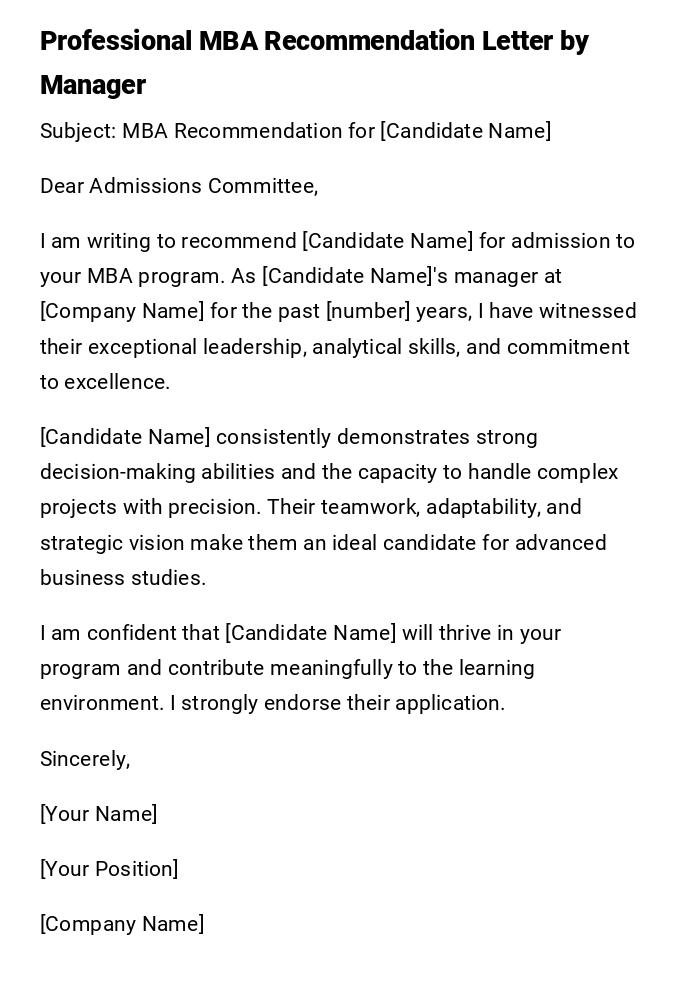
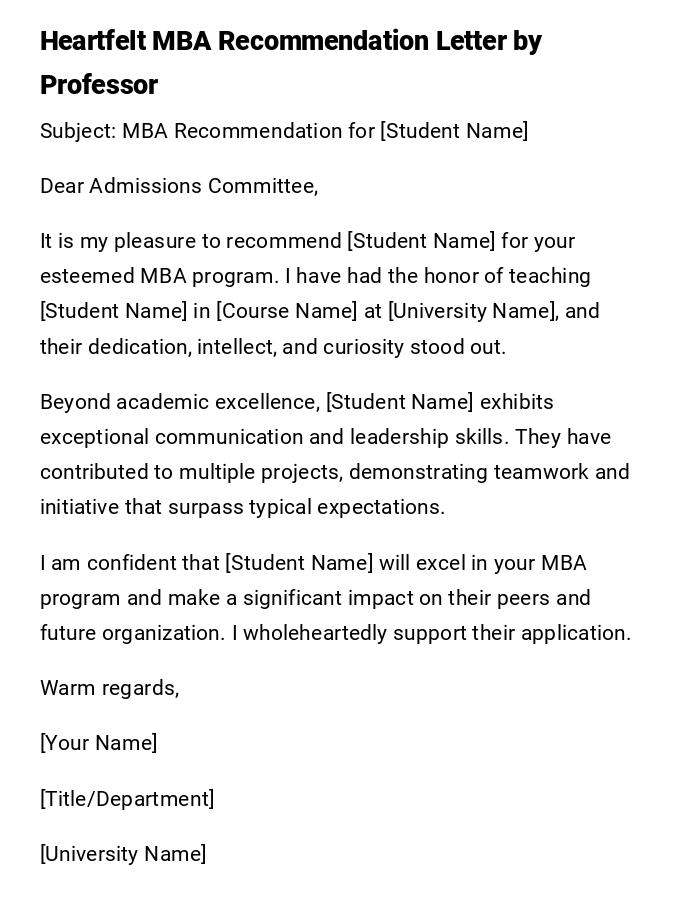
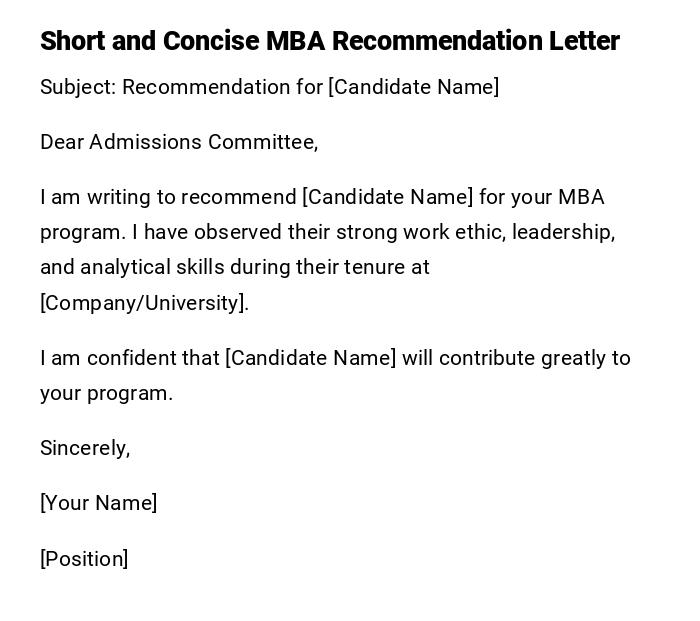
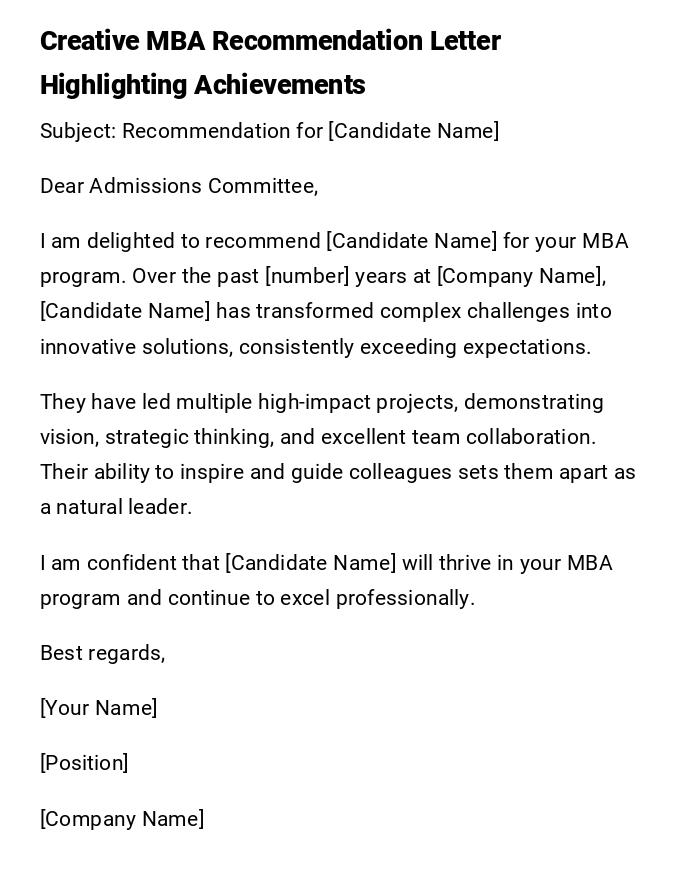
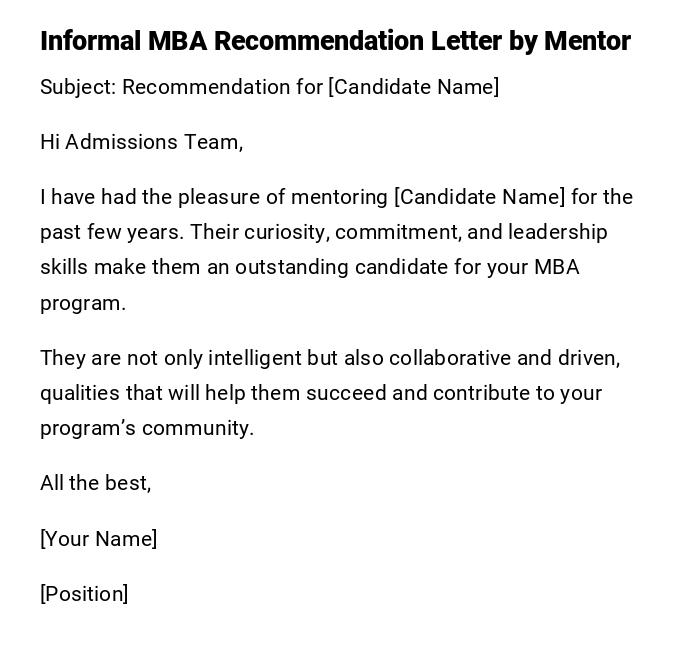
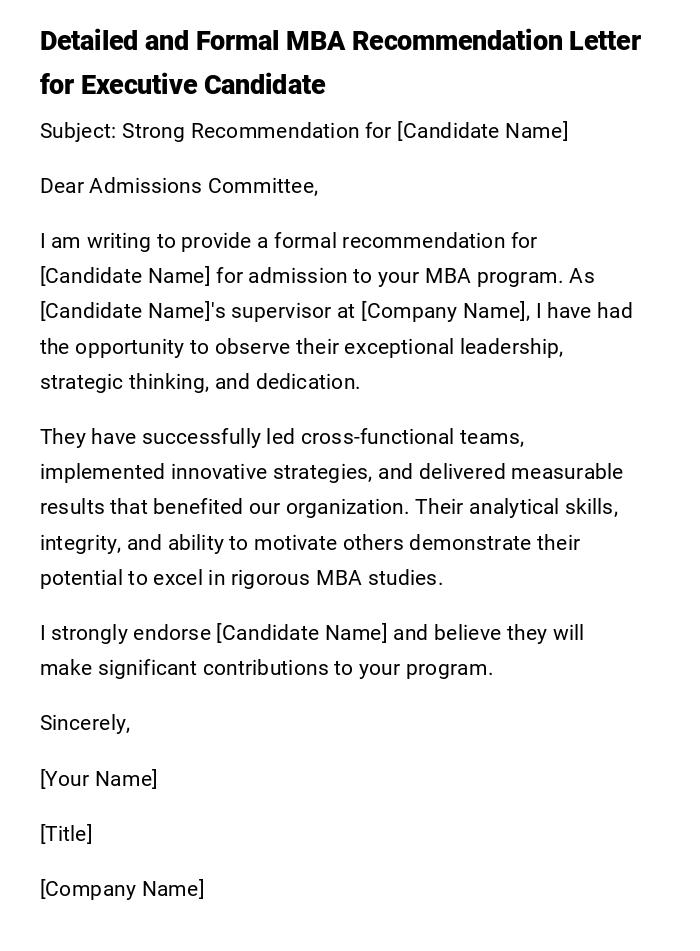
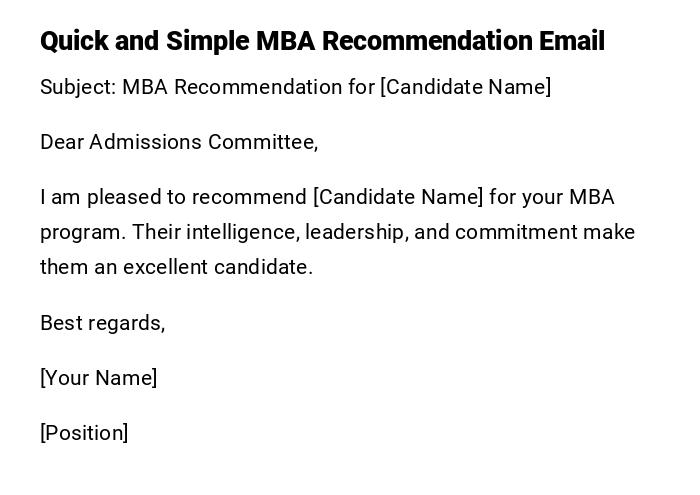

 Download Word Doc
Download Word Doc
 Download PDF
Download PDF